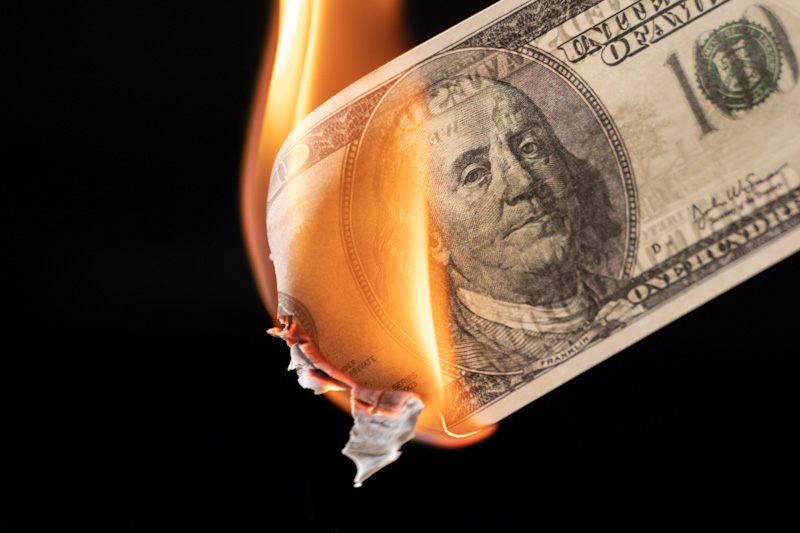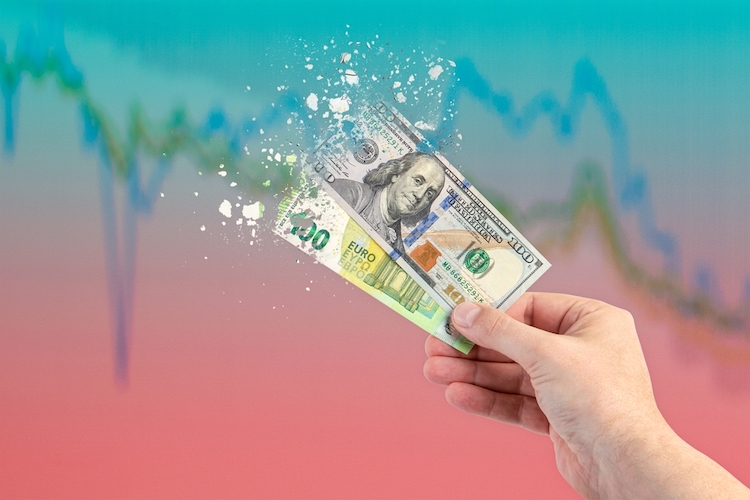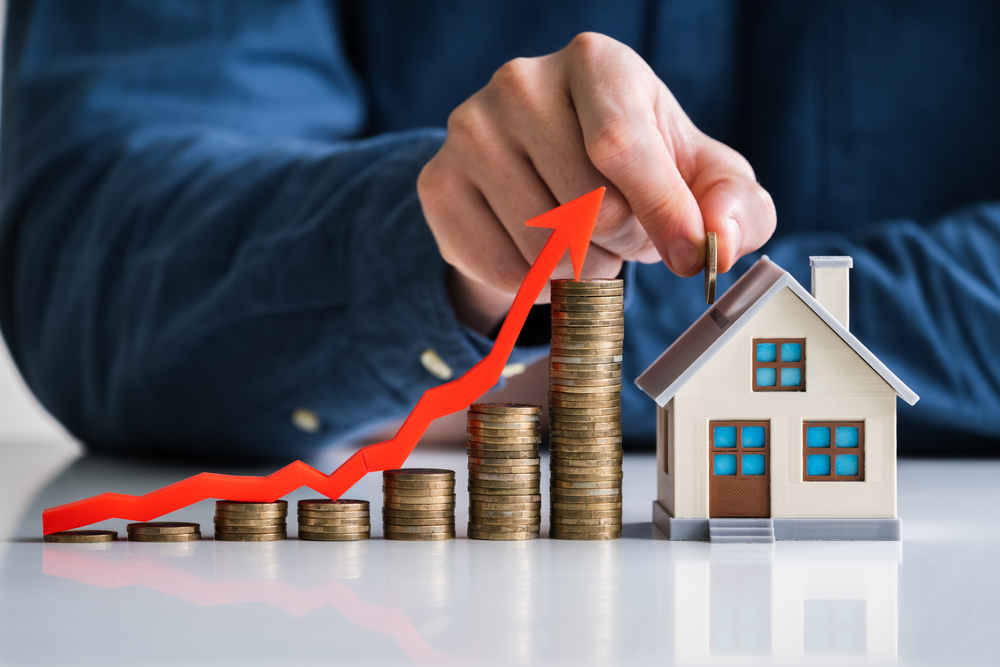Ever since the 2008/2009 housing crash, I’ve been hearing one financial guru after another talk about how the United States was heading into another financial collapse. Each had their reasons, all of which sounded plausible. But that didn’t necessarily make them true. There’s something different going on today though… this is, they’re all talking about the impending financial collapse; not just one or two of them.
The question for us, is whether this collapse is a real possibility, not whether it is a probability. We in the prepping movement deal in possibilities. If we only prepare for what we’re convinced is coming our way, we won’t do much prepping.
Of course, the answer to that question is a resounding yes and for a variety of reasons.
Click HERE to Get the World’s Smallest Battery,
That Powers Your House For More Than 2 Days!
Inflation
There’s no question that we’re seeing high inflation, no matter how hard the administration tries to hide it. The official inflation figures of eight point something percent are based on the consumer price index, which the government is constantly changing to hide the true inflation rate. But even that is the highest inflation we’ve seen in more than four decades. That alone means that our money isn’t going as far, causing the average family to tighten their belts.
Regardless of how much they try to tell us that inflation is caused by greedy corporations, it’s not. Inflation is caused by the government; specifically, by the government spending money they don’t have. Every time Congress passes one of those trillion-dollar bills into law, the Federal Reserve issues the money. Where does that money come from? They pull it out of thin air, creating it themselves. Since the total value of our GNP hasn’t increased by that amount, what they are essentially doing is diluting the value of all the dollars that are out there by the amount necessary to make up for the new money they issued.
Once they’ve done that, making out money worth less, costs are automatically increased for business and industry, especially for anything imported from overseas. That results in those companies raising their prices, so that they can remain profitable. Hence, we end up with second-order inflation, adding to what the government has already done. However, had the government not started the inflationary cycle, those businesses would not have to raise their prices.
Nevertheless, inflation alone won’t create a financial collapse. The two big signs that people look for are high inflation, much higher than the 8+ percent we’re dealing with right now and high unemployment. During the Great Depression, unemployment topped out at about 25 percent. We’re nowhere near that point right now.
The Dollar as the World’s Reserve Currency
Ever since 1945, the dollar has been the world’s reserve currency. That came about largely because the United States was the only major player who was still on their feet, financially speaking, after World War II. All the other major economies were in a shambles; most needing to be bailed out by the United States.
Being the world’s reserve currency mostly means that the US dollar is the currency used for international commerce. Countries who buy from other countries mostly pay in US dollars. This has led to the dollar receiving the monicker “petrodollar,” as the largest segment of international commerce is crude petroleum and petroleum products.
While the dollar isn’t the only reserve currency in the world, it’s by far the biggest one. That has allowed the United States Treasury Department to export much of our national debt overseas, selling it to others in the form of bonds and other debt instruments. That gives those countries the dollars they need to have for international commerce, while bringing money into the United States’ coffers.
Now, here’s the problem. There are several countries who are working hard at making their own currency the leading world currency, in place of the dollar. The European Union and their currency the “Euro” was created for this purpose. Countries within the European Union trade with each other using the Euro, rather than the dollar. Even so, they aren’t the economy we should be watching; China is in an active campaign to have their currency replace the dollar as the world’s reserve currency. They already have agreements with Russia to do business in their own currency and are working hard at forming such agreements with other countries.
Should the US dollar lose status as the world’s reserve currency, countries could call in their dept, requiring the US Treasury buy back their debt instruments at the current dollar value. If enough of that happens, it will cause the value of the dollar to crash. There are currently more than a dozen countries where China is calling in their debt, demanding that those countries pay China before anything else. This is causing the economies of those countries to fall. What makes us think they will treat us any better?
Economic Civil War
Here at home, we could be on the brink of an economic civil war. For years, the political left has attacked businesses which don’t toe the line with their ideology. The left has always been better at supporting their boycotts than the right and they have used that tactic very effectively.
But boycotts are nothing compared to what’s happening now. Companies are being forced to openly embrace such things as going work, forcing their employees to waste time in diversity training and adopt ESG principles in making what should be financial decisions. If they don’t, it’s not consumer boycotts that they face, but a run on their stock value, when major investors bail out.
We’ve recently seen just how dangerous focusing on ESG can be to banks and other businesses. Three major banks have failed, because of being forced to make lending decisions based on the applicant’s ESG score, rather than their financial statement. Just how is that going to hurt other banks and businesses as we go further down that road?
Sadly, there are those in this country who see it as their duty to shove their will down our collective throat. If they can’t pass their crazy ideas through Congress, they will use the courts. If that doesn’t work, they’ll use executive orders. One way or another, they fully intend to take away our freedom and force us to march in lockstep with their “progressive” philosophies.
But that may be changing. When Donald Trump was elected president, I saw it largely as a push back against political correctness, which was taking away our freedom of speech and forcing us to talk in agreement with left-wing terminology and talking points. With Trump no longer in office, the left has increased their assault on our freedom of speech; this time, by trying to force us to use made up gender pronouns.
The recent debacle at Budweiser is a great example of where this is taking us. Bud Light signed a contract with a “transgender woman” and made a special can, showing him/her/whatever on it. Why they would do such a thing is beyond me, considering that transgenders aren’t their market. Transgenders who drink are much more likely to drink a glass of wine, than a beer, and they certainly aren’t interested in the same sports and activities that the majority of Bud Light drinkers are.
This slap in the face against Bud’s customer base has cost the company though, with sales of Bud Light dropping by over 23%. The movement seems to have gained legs, with sales dropping in other Anheuser-Busch products as well. Miller Light, which made a less-serious blunder is seeing reductions in their sales as well. Other companies, who are “going woke” include Target stores, Levi Strauss, Starbucks, and the magazine Sports Illustrated. Can you imagine anyone thinking it’s a good idea to put a guy in a woman’s swimsuit on the cover of the Sports Illustrated cover?
Conservatives, basically just about everyone in what is known as “flyover country” are leaving these brands in droves. But that doesn’t mean that they are just keeping their money. No, they are seeking out companies who share their values, so as to do business with those companies.
Hershey’s recently had their own moment of gender confusion, offering the opportunity for Jeremy’s Chocolate to hit the market. Offered both with nuts and without (“And if you have to ask which is which, go back to Hershey’s”), they sold over half a million bars within their first few days. Another company by the same owner, Jeremy’s Razors, has taken on the very popular Harry’s Razors, who has also decided to go woke, and is taking a sizeable chunk of their clientele.
We can’t forget Hollywood in all this, which has been working overtime to produce movies to indoctrinate us on wokeism, especially how wonderful the LGBTXYZ+ movement is in general and transgenderism is in specific. Somehow, those movies seem to keep bombing at the box office, yet Hollywood keeps producing them.
While there’s a long way to go, before conservatives can say that they have their own marketplace, there is a definite trend in that direction. PublicSq is gaining ground as a conservative alternative for Amazon.com. Elon Musk has bought Twitter, destroying their severe left-wing bias, and Trump has started his own social media app, called Truth Social. While still new, it already has over 2 million users.
What I’m seeing here is what looks like the beginning of a trend. If progressives continue to try and control businesses with their ideology and if conservatives continue to open their own businesses to compete with those “woke corporations,” we could very easily reach a point where there are two retail economies in this country, one serving those on the political right and the other serving those on the political left.
Get Ready for a Rocky Financial Road
Where this all leaves you and I is facing a very rocky financial road. If we don’t have an actual financial collapse, we’ll come closer to it than any of us have seen in our lifetimes. We can expect the next 10 to 20 years to be rough, with high inflation, growing unemployment and ongoing shortages. And that’s if things don’t get bad.
What should you do?
The first and most important thing to do is to get out of debt as much as possible. The people who suffer the most during any financially hard time are those with debt. This will mean taking a close look at your life and how you spend your money. You’ll need to find ways to reduce spending to accomplish that. You may even need to downsize.
The second thing to do is to look at your job, from the viewpoint of how secure it is. As the economy gets worse, people will spend less and less money on luxuries and other things that aren’t necessary. Those working to provide those luxuries will likely be the first to lose their jobs, as the businesses which provide them will be forced to reduce their capacity or shut down.
If you don’t already have some sort of a side gig, now is a good time to start one. That side gig not only will provide you with money to help overcome the problems of inflation, but it will also give you something you can fall back on, should you lose your job.
For us, as preppers, the key, as always, is self-sufficiency. We need to be able to do as much as possible for ourselves, so that we don’t have to pay others to do it for us. That means growing our own food, harvesting our own water, and doing our own repairs. The more we can do for ourselves, the less we have to pay others to do. That will make our money go further.








Travelin On | May 23, 2023
|
What an education!!! Not about the economy, inflation, devaluation, etc., but about this new wave called woke or whatever it is they call it for the transgressors. It’s the first I’ve heard of this particular trend that seemingly has straight people boycotting big businesses. So nice to be retired, fairly self sufficient, and isolated from that kind of influence. This form of education is enough to satisfy me without any further need to be more closely associated with it.
Janet Lewis | June 4, 2023
|
What is going to happen to people like me who depend on retirement from the government? Will we still get paid, or will they stop paying us?
Travelin On | April 19, 2024
|
If the gov’t goes bankrupt, which it can hardly help but doing being so far in debt there’s no way to pay it back, anyone who depends on the gov’t for an income, regardless of retirement, SSDI, welfare, or any other source will no longer be paid. Sadly, the reality is that many will find themselves with nothing.
Doug Collins | April 20, 2024
|
Years ago, Sen William Proxmire said that if and when the US goverment went bust, people would still get their social security checks, He added that the checks might not be worth anything, but that people would get them.
I’m afraid you should plan accordingly.
John Silvers | May 23, 2023
|
A global depression is not just a probability, it is a certainty.
Since the 1970’s the Us Federal government has deliberately and increasingly taken over all aspects of economic activity.
That’s why the national debt is skyrocketing. When the government has created the situation where it is the source for everything, the money spicket will get turned off and people will be brought to heel.
CBDCs will be the final piece to establish social credit scoring as a way of life for the entire world.
Get off centralized systems and become a part of an intentional self sufficient community.
Richard Nelson | May 23, 2023
|
Bill, I expect a short, sharp recession that is just starting, but will be in a bull market again by the end of the year. That caused me to move my portfolio to defensive stocks that pay very strong dividends, some of them MONTHLY, but stay well diversified (I manage my own portfolio, but have professional tools to do it right).. So far this year, I’ve taken only minor losses on days I’ve lost money, and am building my portfolio more quickly with strong dividend stocks. I’m not in Tech or Comms stocks as the former usually cost a lot and either pay no/minimal dividends and the latter are unnecessarily risky, but mine’s been a useful and effective strategy. If you want a quick and accurate FREE overview app and use an iPhone, I recommend the Sector SPDRs app, which will tell you in an instant how the various financial sectors are doing, but has more detailed info on following pages.
Travelin On | July 1, 2024
|
Richard, clearly the expectation you had didn’t work out. The numbers for figuring inflation have been manipulated to cover inflation and make it look less than it really is, and here we are in the middle of 2024, no booming stock market going. Wonder what you think now? Most of the economists I’ve heard are expecting this recession to last most of or even more than a decade like it did during the depression. Curious where you came up with a short, sharp recession!
Sharon Newman Matt | June 3, 2023
|
What is ESG or the ESG score?
Sandra Hoffman | November 11, 2023
|
It’s the government way of rating your politics basically. It stands for environment, social, and government score. So the more in line you…or your business is will determine if you get a loan or not. Green energy business would receive a higher rating than a fossil fuel business for example. Probably the reason Target and Budweiser did what they did, even though they paid a price in loss of revenue.
James Gregg | April 19, 2024
|
Sorry but the CPI is at 3.5%, not 8.5%. I keep hearing people talk about the cumulative value, CPI is usually done on 1 year effects. The price of goods and services between 2 points usually 1 year apart. Now in a normal market, that works. But postCovid, the US is not back to business as usual. Part of the problem is the worker shortage. This increases the cost of goods and services when we try to compare it to other time periods. Because there is a worker shortage (many retired in 2020), currently we are experiencing 1.9 jobs for every unemployed worker. Which means companies paying higher wages to workers that get passed on to consumers. Which means comparing prices between certain years must be done as a percentage versus outright. For instance, what was the difference in price points of goods and services when compared at certain wages versus today’s prices at today’s wages. Because when wages went up, they also increased the price of goods and services because the increases in wages were passed on to the consumer. So comparing the price of goods and services between two different wages will of course be different, they will be higher due to the higher wage. So we can’t say that goods and services are inflated just by comparing the difference in price, we must also compare the wage being paid.
Ron | April 19, 2024
|
Just wait. The robots and AI will eliminate the need for workers in many industries. I was reading an article today in AARP that the guy bought the lawn robot that moves the lawn daily and stops when it’s a rainy day.. Every year, there will be more robots and more AI software that will grab more and more of the job market.
Doug Collins | April 20, 2024
|
If you are in debt and lose your job, thus putting your house and/or car in jeopardy, you will be in much less danger of losing it to creditors if you still owe most of its value, as opposed to owing little. The reason is that, from the bank’s point of view, repossessing an asset that has been mostly paid off looks great on their books. They write off a little and gain a valuable asset that is worth much more than the write-off. If they repossess a house that may even have lost value and have to write off a large loan total too – then the books don’t look so good.
If you are close to paying off a loan, then the best case is to go ahead and pay it off. If you can’t do that, it might be a good idea to refinance so you won’t look like such a good repossession target. One strategy, if interest rates continue to increase, would be to negotiate a lump sum payoff of the loan for a smaller amount of principal so they can get your low interest loan off their books. If your interest rate is small enough relative to the current rate, you might be causing them enough pain to make that deal attractive to them.
Travelin On | July 1, 2024
|
Or, as some banks have done when interest rates increase and they want to loan money at the higher interest rates and you have a low interest rate, and have been faithfully making payments, (not talking about having lost a job here) and you can find some help somewhere, tightening other budget items to help pay off the small amount of the loan you have remaining, sometimes the bank will bargain with you that for some dollar amount over the normal monthly payment you make, such as double the payment, they will knock off 1/2% interest on your loan, just trying to get the money free to loan at a higher rate. The bank my folks used when purchasing a house had a few thousand dollars left on the loan which was at 4% in the late 1970’s and 1980’s when interest rates on new loans were at 13%, the bank offered this option to my folks, wanting the money free to loan at the higher interest rate. Dad cut their budget items to amounts nothing, and began paying the bank quadruple or quintuple payments (fortunately the loan amount per month wasn’t that high) and they reduced their 4% loan to 2 or 2 1/2% until they got the house paid off. It was a good deal for both parties. It took them 2 or 3 years to pay the loan off at that rate, but sure beat having an outstanding loan for the next umpteen years. Best option of all is do not buy until you can pay 100% down on your purchase so you hold the title to what you purchased. Yes, it is possible both with homes and with vehicles. Living like the irresponsible gov’t does, does not make the choice a wise one. Those who are in debt are slaves to the borrower. Not a good position to be in. Better to do with less until you can save up enough to buy something outright. Since the US debt is now at or pass the asymptote mark and there is no possible way to pay back the debt we owe as a country at #34.72 trillion, much less the majority of the people who have a consumer debt number of $17.987 trillion as of the first quarter of 2024, most people in this country are heavily in debt, following a very unwise government spending plan. The Federal Reserve thanks the government and the grossly indebted citizenry for every penny of their debt. Also, don’t forget about the bank bail in laws that now exist and if a bank gets in trouble, there’s no guarantee of a federal bail out and the banks (airlines or anything else) are no longer considered to be entities that cannot fail. If man creates it, it not only can but will fail. Also, with all the above facts (all easily obtainable by googling) there is this startling fact, as of 9/20/2023 the amount of currency in circulation is only $2.33 trillion. The vast majority of debt is all digital. Therefore, it is wise to put some physical cash aside because when things really go south on the digital front, those who have some of that physical cash on hand may still be able to do business. Yes, the gov’t would like to make this a cashless society, the better to make victims of the citizenry. Those who have followed a very irresponsible government’s spending habits will pay untold prices in emotional and physical realms, especially if they lose their jobs..
James Gregg | April 21, 2025
|
Of course a the economy going down is possible. Currently we are in a trade war with China. Trump’s tariffs will create a recession. Its not if, its when. The economy under Biden was the envy of the world. Unfortunately, many people get the economy (how US businesses are doing) mixed up with the cost of living (inflation). The economy is measured in GDP. In 2021,, the economy was the highest since 1984. But playing chicken with China is a losing proposition. China has a consumer base of several billion while the US has 331 million. So China can refuse to allow US exports in to the country. Trump has also instituted an us or them policy where countries will have to choose between China and the US. Once again, China has a consumer base 7X higher than the US. China just called Trump’s bluff by saying countries will have to choose between China and the US. So between Trump’s 10% minimum tariffs and many of our trade partners being pissed off at Trump, its quite possible that most of the world will choose China. Which will severely impact US businesses. Additionally, the US imports a lot of goods that if the supply is cut off will cause inflation to skyrocket. For instance, 50% of tomatoes sold in the US comes from Mexico. But if Mexico sells them to China instead, the price of tomatoes will double in the US. Farmers rely on selling surplus crops to other countries. But if those countries don’t buy our crops, then farmers will eventually gi bankrupt. It happened during Trump’s first term. We also had to subsidize farmers because of the trade war. Additionally DOGE cut a lot of farmers government programs where farmers sold to various agencies. USAID bought crops for various hunger programs. Which means unless farmers get major subsidies, many farmers will go bankrupt once again.
For many years, Republicans were fiscal hawks. Unfortunately those days are gone. Now both parties are constantly adding to the debt. Democrats add programs and Republicans cut taxes. While the later is nice, cutting taxes without cutting spending just adds to the deficit which in turn adds to the debt. Taxes are government revenue. So when we cut taxes it means less money coming in. There are only two ways to drop the debt. Raise taxes or cut spending. Unfortunately, 70% of government spending is mandatory spending. So if the budget is $5 trillion, then if we cut all non mandatory spending, we only will save $1.5 trillion. And that’s without cutting taxes. Throw that in to the mix and you the debt will never go down.